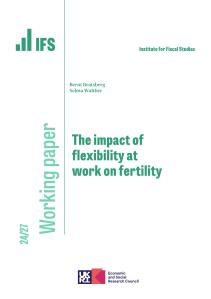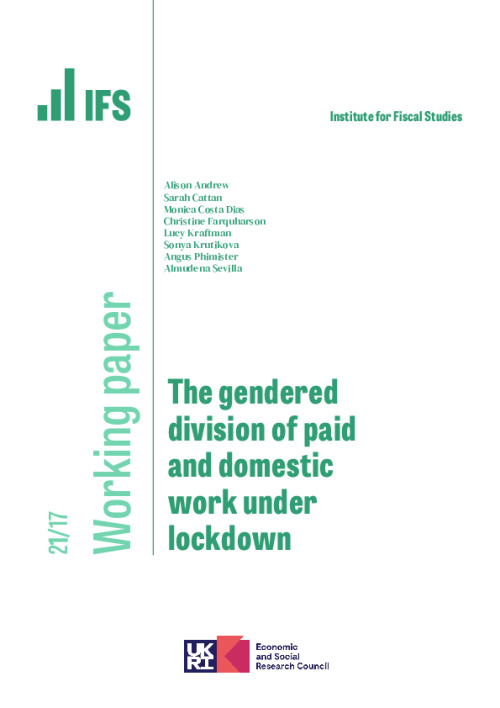Downloads
This paper provides novel empirical evidence on the effects of the COVID-19 pandemic on the division of labour among parents of school-aged children in two-parent opposite-gender families. In line with existing evidence, we find that mothers' paid work took a larger hit than that of fathers, and that mothers spent substantially longer doing childcare and housework than their partners. We go further to show that these gender differences cannot be explained by gender differences in the industries and occupations in which parents worked prior to the lockdown. Nor can they be explained by gender differences in earnings prior to the crisis: independently of which parent earned the most before the pandemic, it is always mothers who adjusted time spent on paid and unpaid work more significantly. This is the case even in households where only one partner remained active in paid work. While we cannot fully rule out that these asymmetric responses are explained by gender differences in productivity in domestic work, our results do suggest that other factors, such as gender norms, may play an important role.
Authors

Deputy Research Director
Monica is a Deputy Research Director and Professor of Economics at the University of Bristol, with an interest in Labour, Family and Public Economics.


Research Fellow
Alison is a Senior Research Economist of our Institute with research interests in the economics of gender, marriage and education.

Deputy Research Director
Sonya Krutikova is an Associate Professor of Economics at Manchester University and IFS Deputy Research Director.

Associate Director
Christine's research examines inequalities in children's education and health, especially in the early education and childcare sector.

Angus Phimister

Lucy Kraftman

Almudena Sevilla
Working Paper details
- DOI
- 10.1920/wp.ifs.2021.1721
- Publisher
- Institute for Fiscal Studies
Suggested citation
Andrew, A et al. (2021). The gendered division of paid and domestic work under lockdown. London: Institute for Fiscal Studies. Available at: https://ifs.org.uk/publications/gendered-division-paid-and-domestic-work-under-lockdown (accessed: 30 June 2024).
More from IFS
Understand this issue

Sure Start achieved its aims, then we threw it away
15 April 2024

What is the two-child limit in benefits?
27 June 2024

If you can’t see it, you can’t be it: role models influence female junior doctors’ choice of medical specialty
24 April 2024
Policy analysis

Free breakfast clubs in schools: what Labour’s plans would mean for pupils and families
25 June 2024

How have the size and shape of the UK state changed?
9 June 2024

Size of the state has grown over this parliament and is likely to remain permanently bigger than pre-pandemic
9 June 2024
Academic research

The intergenerational elasticity of earnings: Exploring the mechanisms
3 June 2024

Targeting men, women or both to reduce child marriage
28 May 2024

The impact of flexibility at work on fertility
11 June 2024
